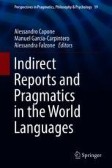Search
Search Results
-
Moving heads to specifiers: Evidence from Mandarin multiple pre-subject modals
Based on a hitherto neglected set of multiple pre-subject modal sentences, this article offers a novel syntactic account of Mandarin modals whereby...

-
Finding the force: How children discern possibility and necessity modals
This paper investigates when and how children figure out the force of modals: that possibility modals (e.g., can / might ) express possibility, and...

-
The restrictor view, without covert modals
The view that if -clauses function semantically as restrictors is widely regarded as the only candidate for a fully general account of conditionals....

-
Semantic expressivism for epistemic modals
Expressivists about epistemic modals deny that ‘Jane might be late’ canonically serves to express the speaker’s acceptance of a certain propositional...
-
Probabilistic semantics for epistemic modals: Normality assumptions, conditional epistemic spaces and the strength of must and might
The epistemic modal auxiliaries must and might are vehicles for expressing the force with which a proposition follows from some body of evidence or...

-
The indexical character of epistemic modality
We assume a central thesis about modal auxiliaries due to Angelika Kratzer, the modal base presupposition: natural language expressions that contain...

-
Some Constraints on Contextualism About Modals
The following paradigm, most closely associated with the work of Angelika Kratzer, dominates the literature on the semantics of modals: MUST is a...
-
Strengthened, and weakened, by belief
This paper discusses a set of observations, many of which are novel, concerning differences between the adjectival modals certain and possible and...

-
Epistemic modality and comparison in Mandarin Chinese
The epistemic use of the modal element yào in Mandarin Chinese comes with typologically rare properties. First and foremost, epistemic yào is...

-
Is degree abstraction a parameter or a universal? Evidence from Mandarin Chinese
Mandarin Chinese, along with Japanese, Yorùbá, Mòoré, and Samoan, has been argued to lack ‘degree abstraction’, a configuration at LF involving...

-
Assessing alternatives: the case of the presumptive future in Italian
In this paper, we study the distribution and interpretation of a non-temporal use of the future tense in Italian, called ‘presumptive’ or...

-
Counterfactuals and modality
This essay calls attention to a set of linguistic interactions between counterfactual conditionals, on one hand, and possibility modals like could have ...

-
On Kratzer’s “The Notional Category of Modality”
A. Kratzer’s “The Notional Category of Modality” (NCM) develops a unified analysis of modals and conditionals, which has come to be the classic...
-
Striking the Right Note: A Corpus-Assisted Study of Deontic Modality in Translating PRC Civil Code into English
Legislative texts include mainly those legal documents such as laws, regulations, and treaties in writing, reflecting the legal intent of state power...
-
Reporting Conditionals with Modals
Conditionals and modals work in tandem in some instances of practical reasoning, or decision making. Consider the following example (from Kratzer...
-
Numerals Denote Degree Quantifiers: Evidence from Child Language
A large body of work in both the theoretical and experimental literature suggests that upper bound implications in simple sentences with bare...
-
Modals under epistemic tension
According to Kratzer’s influential account of epistemic must and might , these operators involve quantification over domains of possibilities...
-
Frequency and Variability in the Use of Modal Verbs in Zimbabwean English
This corpus-based exploratory study examines modal verbs in Zimbabwean English (ZimE), and British English, to determine whether there are variations...
-
The Italian futuro as a non-biased epistemic necessity: a reply to Ippolito and Farkas
In a recent paper, Ippolito and Farkas (Linguist Philos, 45(4):943–984, 2022b) (I &F) question the premise that Italian future is epistemic...

